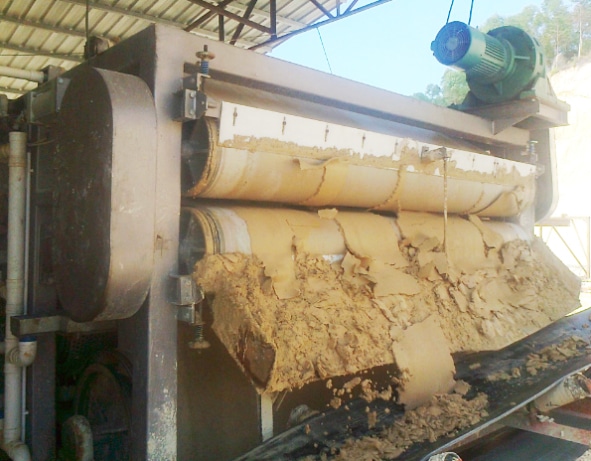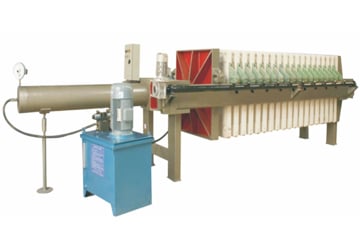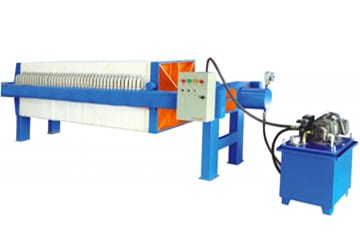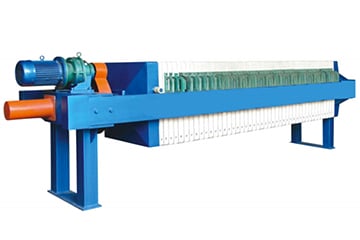Centrifuges and filter presses are both devices used to separate solids from liquids. Centrifuges separate solids from liquids by centrifugal force generated by high-speed rotation, while filter presses use mechanical pressure to separate solids from liquids in a mixture. They have important applications in the fields of medicine, food, chemicals, and wastewater treatment.
Difference between centrifuge and filter press working principle
The operating principle of centrifuges is based on the application of centrifugal force. When a mixture is placed in a rotary centrifuge, the high speed rotation generates an outward centrifugal force, which causes the solid particles and the liquid to separate under the force. Since solid particles are denser than liquids, they are deposited to the bottom of the vessel to form a solid sludge, while the liquid moves up the outer wall of the vessel to form a supernatant. By controlling the speed and time of rotation, solids and liquids can be effectively separated.
Filter presses work by utilizing the application of mechanical pressure to separate solids from liquids by passing the liquid in the mixture through a filtration medium. Once the mixture is placed in the filter press, mechanical pressure is applied to the mixture, causing the liquid to pass through the microscopic pores or screens of the filtration media, while the solid particles are retained in the filtration media to form a solid residue. Efficient solid-liquid separation can be achieved by adjusting the pressure and choice of filter media.

Centrifuge and filter press applications
Application scenarios for centrifuges include but are not limited to:
Clarifying liquids: used to separate suspended solid particles or precipitates to make liquids clear and transparent.
Concentration of solids: to enrich solid particles in a solution or suspension into a smaller volume for subsequent processing or storage.
Separating liquid-liquid mixtures: used to separate two immiscible liquids, such as separating emulsions in biopharmaceuticals.
Application scenarios for filter presses include but are not limited to:
Dewatering sludge: Used to treat sludge in wastewater treatment plants by separating the water in the sludge through a pressure filter to reduce the volume of the sludge.
Producing Filter Cake: In the chemical, pharmaceutical and food industries, filter presses are used to separate liquids from solid suspensions or slurries to form a solid filter cake for subsequent processing or utilization.
Efficiency and flux of centrifuges and filter presses
Centrifuges are characterized by fast processing time and high throughput, which is determined by their working principle of using centrifugal force to separate solid particles from liquids. Compared to other solid-liquid separation equipment, centrifuges are able to complete the separation process in a shorter period of time and have a higher throughput capacity. As an example, centrifuges are often used in the pharmaceutical industry for the separation of cell culture fluids, where their fast processing speeds effectively increase productivity.
Filter presses are characterized by producing drier solids and filtrates with higher solid content. By applying mechanical pressure, filter presses can pass liquids through the filter media, separate solid particles, and produce a relatively dry solid material and filtrate with a higher solids content. This feature makes the filter press widely used where high solids content or dry solids are required, such as filtering slurries in chemical production, or dryer solid wastes in sludge treatment.
Maintenance and operating costs of centrifuges and filter presses
The cost considerations for centrifuges are mainly in terms of higher maintenance costs and potentially higher initial investment costs. Centrifuges, as a kind of sophisticated mechanical equipment, require regular maintenance and upkeep, including replacement of parts, calibration and adjustment, etc., all of which entail additional cost expenditures. In addition, as centrifuges usually require a high level of technical skills and specialized knowledge to operate and maintain, the training and management costs of the relevant personnel also need to be taken into account. In addition, the initial investment cost of centrifuges may be higher, especially for large, high-performance centrifuge equipment, which may be more expensive, which requires companies to conduct a full cost-benefit analysis and budget planning before purchasing to ensure that the investment is reasonable and sustainable.
The cost considerations for filter presses, on the other hand, are mainly reflected in their lower operating costs and maintenance requirements. Compared to centrifuges, filter presses are usually simpler in construction and operation, and have relatively low maintenance costs. Since filter presses do not require additional energy consumption (e.g., electricity or compressed air), their operating costs are low. In addition, filter presses usually have stable operational performance and can maintain efficient and stable working conditions for a long period of time, which helps to reduce the additional cost of equipment failure and downtime for maintenance. Therefore, in the long run, filter presses tend to bring lower overall operating costs and better economic benefits to organizations.
Recommendations for selection
Choosing the right equipment for different needs is crucial. For scenarios where a large number of samples need to be processed quickly, a centrifuge may be a better choice as it can provide faster processing speeds and high throughput. For scenarios that require a drier solid product or a filtrate with a higher solids content, a filter press may be more appropriate as it is typically capable of producing drier solids and a filtrate with a higher solids content. KUOSI has different types of filter press equipment: hydraulic filter press, chamber filter press and Plate and Frame Filter Press, among others.



Summary
Centrifuges and filter presses have different working principles and application scenarios in the field of solid-liquid separation. Choosing the right equipment should take into account factors such as processing capacity, efficiency, maintenance costs and stability to ensure optimal solid-liquid separation.
KUOSI offers a wide range of filter press models. In addition to filter presses we also offer sludge dewatering equipment, sludge dryer equipment, dosing systems, blowers, disinfection systems and wastewater screens. Please consult us if you have any questions.
